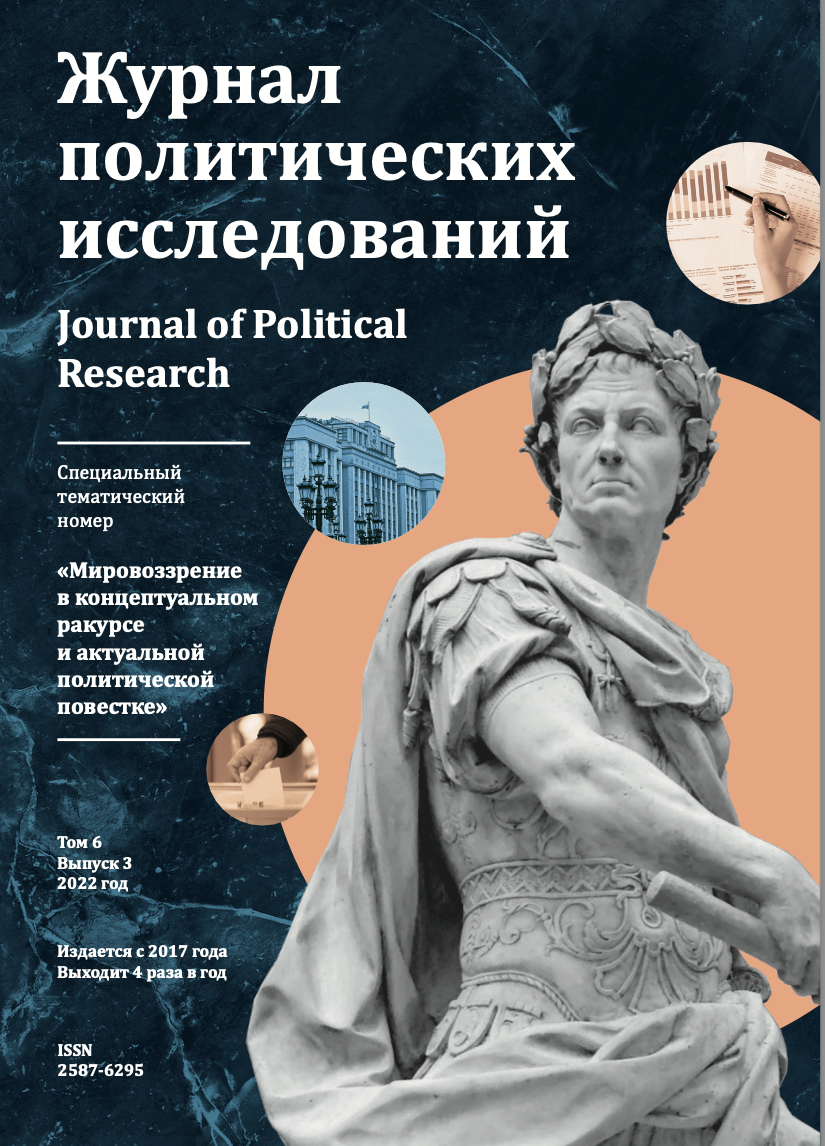Russian Federation
Russian Federation
At the moment, the task is to scientifically comprehend successful methods and technologies for updating civil solidarity in the context of social disorganization of society and the search for unifying grounds for the country's citizens. Mobilization of community resources at the local level in conditions of heterogeneity of socio-economic and socio-cultural space is possible only through the practice of civil solidarity built on the basis of civic identity. The purpose of this study is to identify and describe geopolitical, socio-economic, political-legal and socio-cultural factors that influence the formation of civil solidarity in urban and rural areas of the regions of Southern Russia, as well as formats for including residents in solidarity practices. We have studied rural and urban areas of the regions of the South of Russia (Krasnodar Territory, Republic of Crimea, Republic of Adygea) in order to characterize the entire set of factors influencing the formation of civil solidarity in the territories of Russia. The choice of the object of study is determined by a wide range of destabilizing, polarizing factors that are currently being recorded in the Southern Federal District. Transcripts of 45 expert interviews (15 experts from each selected region of the Southern Federal District) and the results of a questionnaire survey (969 respondents in 3 regions) were used as an empirical basis. The study identifies and describes the most significant factors in the formation of civil solidarity: institutional, value-based, external challenges and threats, the mobilization potential of residents of the territory, formats of interaction in the existing settlement structure and the leadership factor.
civil solidarity, civic identity, identity politics, urban areas, rural areas
1. Anderson B. Voobrazhaemye soobshchestva. Razmyshleniya ob istokakh i rasprostranenii natsionalizma [Imagined communities: reflections on the origin and spread of nationalism]. M., Kuchkovo pole Publ., 2016, 416 p. (In Russian).
2. Bek U. Obshchestvo riska. Na puti k drugomu modernu [Risk Society: Towards a New Modernity]. - M., Progress-Traditsiya, 2000, 384 p. (In Russian).
3. Berger P., Lukmann T. Sotsial'noe konstruirovanie real'nosti. Traktat po sotsiologii znaniya [The Social Construction of Reality: A treatise in the sociology of knowledge]. M., “Medium” Publ., 1995, 323 p. (In Russian).
4. Bourdieu P. Sotsiologiya politiki [Sociology of politics]. M., Socio-Logos Publ., 1993, 336 p. (In Russian).
5. Giddens E. Sud'ba, risk i bezopasnost' [Fate, Risk and Security]. THESIS [THESIS], 1994, № 6, pp. 40-102. (In Russian).
6. Krasin Yu. A. Sotsial'noe neravenstvo v politicheskom izmerenii [Social inequality in the political dimension]. Available at: https://www.perspektivy.info/book/socialnoje_neravenstvo_v_politicheskom_izmerenii_2008-12-04.htm (Accessed: 12.09.23) (In Russian).
7. Luman N. Ponyatie riska [Risk concept]. THESIS [THESIS]. 1994, I. 5, pp. 4-160. (In Russian).
8. Rusiya N. T. Simvolicheskie resursy politiki identichnosti na lokal'nom urovne (na primere sel'skikh territoriy Krasnodarskogo kraya) [Symbolic resources of identity policy at the local level (on the example of rural territories of the Krasnodar region).] Kaspiyskiy region: politika, ekonomika, kul'tura [The Caspian Region: Politics, Economics, Culture]. 2022, I. 2 (71), pp. 86-94. (In Russian).
9. Ukhanova Yu.V. Kollektivnye praktiki i potentsial grazhdanskogo uchastiya lokal'nogo soobshchestva (sotsiologicheskoe issledovanie v rossiyskikh regionakh) [Collective practices and potential for civic participation of local community (sociological research in Russian regions)]. Problemy razvitiya territorii [Problems of territory development], 2021, I. 1, pp. 88-107. (In Russian).
10. Ettsioni A. Ot imperii k soobshchestvu. Novyy podkhod k mezhdunarodnym otnosheniyam [From empire to community. A new approach to international relations]. M., Ladomir, 2004, 384 p. (In Russian).
11. Alexander J.C. The civil sphere. Oxford, Oxford univ. press Publ., 2006, 793 p.
12. Blau P.M. The dynamics of bureaucracy. Chicago, 1955, 269 p.
13. Fukuyama F. Social capital and the global economy, Foreing Affairs, 1995, I. 74, pp. 52-58.
14. Homans G.C. Social behavior: Its elementary forms. N.Y.; Burlingame, Harcourt, Brace & World Inc., 1961, 404 p.
15. Molm, L. Theories of social exchange and exchange networks. In B. Smart & G. Ritzer (eds.), Handbook of Social Theory. Sage Publications. 2001, pp. 260-272.
16. Parsons T. Values, Motives and Systems of Action / Parsons T., Shils E. (eds.) Toward a General Theory of Action. Cambridge, Harvard University Press Publ., 1954, 506 p.
17. Portes A. Social Capital: Its Origins and Applications in Modern Sociology, Annual Review of Sociology, 1998, V. 24, pp. 1-24.
18. Putnam R.D. Bowling Alone: The Collapse and Revival of American Community. New York, Touchstone Books by Simon & Schuster Publ., 2001, 544 r.




















